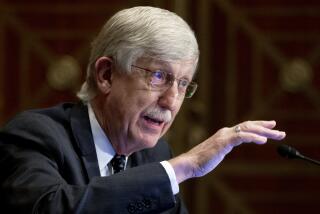NIH to Draft Researchers’ Code of Ethics
WASHINGTON — The National Institutes of Health will develop guidelines defining conflict of interest for non-government scientists who receive federal funds for their research, the director of the agency told Congress Tuesday.
Dr. James B. Wyngaarden, director of NIH, which awards about $7 billion in grants annually, disclosed the plan to a House subcommittee that is investigating whether government-sponsored research is being compromised by scientists’ financial associations with private companies.
“The Public Health Service is concerned about maintaining the integrity of science,” Wyngaarden told the Government Operations Committee’s subcommittee on human resources and intergovernmental relations. “We believe that protection of that integrity must be a joint effort on the part of the government and the institutions where research is performed.”
He and others said that such partnerships were necessary to the advancement of science, but warned that they could also create a climate for conflict of interest.
“I have heard it said within the scientific community that everyone gains from this marriage of academia and commerce,” said Sheldon Krimsky, an associate professor in the department of urban and environmental policy at Tufts University. “Nothing can be further from the truth. Not only are there losses, but some of these losses threaten the integrity of our scientific institutions and weaken public confidence in science.”
Wyngaarden said that NIH requires its scientists to disclose their financial interests to prove they have no monetary association with any company whose products they study, but as yet, the agency has no similar rule for non-governmental researchers who receive federal grants.
To that end, Wyngaarden said, NIH and the Alcohol, Drug Abuse and Mental Health Administration plan to sponsor a two-day meeting later this month on conflict of interest and what the agencies should do about it.
He said the conference will take up issues such as whether a researcher’s financial interest or arrangement with a company would necessarily influence the outcome of the research, and whether scientists should be permitted to profit financially from information obtained in the course of their research.
“We must ensure that research results are not distorted by financial involvements of investigators, but we must also ensure that the progress of science is unhindered,” Wyngaarden said.
Subcommittee Chairman Rep. Ted Weiss (D-N.Y.) attacked university programs, specifically at the Massachusetts Institute of Technology, that encourage exchanges of research findings with corporations--including many foreign companies. Weiss and others contend that such arrangements can hurt U.S. interests.
In MIT’s Industrial Liaison Program, firms pay the institute a membership fee--in some cases as much as $50,000 annually--and are allowed access to MIT research publications and other data.
David Noble, a history professor at Drexel University who is suing MIT on the grounds that he was dismissed from the institute for publicly condemning conflicts of interest, told the subcommittee that all member corporations of the Industrial Liaison Program were multinationals “with no necessary allegiance to the United States” and that the majority of the foreign corporation-members were “major Japanese competitors.”
MIT President Paul E. Gray defended the program. He said: “The educational and research functions of this science-based university require broadly based understanding of industrial practice and industrial needs. The ILP is an important vehicle for developing that understanding, and this is its principal benefit to the institute.”
More to Read
Sign up for Essential California
The most important California stories and recommendations in your inbox every morning.
You may occasionally receive promotional content from the Los Angeles Times.









